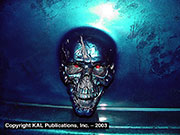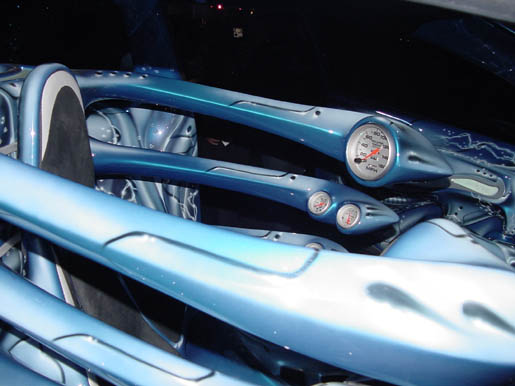
November 2003 Issue Highlights
For more complete coverage, send us an e-mail to
request a back issue.

For more complete coverage, send us an e-mail to
request a back issue.
November 2003 Cover

Editor's Choice:
Hot Import Nights Show
Los Angeles, CA

The underlying idea at the Hot Import Nights Show was the merger of street cars and street car culture with Japanese anime. And this car, the Alpine show car, took it to the extreme. The passenger seats were removed and replaced with one driver seat that looked like a pod. Traditional automotive elements such as gauges and speakers, of course, were installed into finger–like extensions that created literal surround sound. Even the interior paint job suggested the driver was traveling through nebulae. Creative and spectacular.
Want to order a photo from the issue? Click here for more information about photo sales.
Mobile Mechanic Meets Customer Need
Packaging Sells Lubes, Says Study
Consumers Choosing Chain Stores
An auto mechanic who is working out of his truck instead of a shop has developed a strong customer base in the San Fernando Valley.
Rick Jokela has launched Mobile Auto Services by Rick. Although Jokela has a shop in Canoga Park, the majority of his business is done in the field by customers who are seeking his unusual house call service.
"There's nothing I can't do out in the field," Jokela told local reporters. "I've got all my tools right here in the van."
For more complicated jobs, Jokela or his staff of two delivers broken parts to local machine shops for repair. He stays in touch with his customers and staff via cell phone while in the field.
"I make my money on good service," said Jokela. "And making that money is a race against time."
Although there were some concerns that a mechanic without a shop would be perceived as untrustworthy, Jokela says that "I don't short change my customers. You've got to be honest with them. The customers I get have been burned before and this way they can keep an eye on the mechanic. I kind of like that. It gives me a chance to show off."
The program is working; Jokela reports that his business has grown to over 700 customers since he founded the company in 1997 and expects its expansion will continue.
A new study has found that lubricant packaging sells — "what the lubricant is in may be more important that what is in the lubricant."
According to a study by Kline & Company, "The Outlook for Packaging In Lubricants 2000," it is increasingly difficult to differentiate lubricants based on performance.
"Performance specifications continue to level the playing field in the lubricants business and challenge marketers to find ways other than performance claims to differentiate products," explained Thomas Glenn of Kline & Company.
It is increasingly difficult to make meaningful claims about performance advantages in such products as passenger car motor oil and heavy-duty motor oil because these products must meet stringent performance specifications in order to gain approval from the American Petroleum Institute. Although blenders can exceed these performance specifications, the costs to do so are relatively high, and consumers tend to be indifferent to improvements that can only be realized in laboratory testing and long-term durability.
Performance specifications are also leveling the playing field in products such as automatic transmission fluid, hydraulic fluid, gear oil, and other industrial lubricants.
"Some segments of the lubricants market are being commoditized, and in these segments, it is not necessarily about what is in the package that sells lubricants," said Glenn. "Rather, it is about the size, shape, color, and what is on the label that makes the difference."
In the last few years, the lubricants business has seen the growth of four-color, consumer-oriented cases for marketing motor oil and other lubricant products as well as improvements in label technology and quality. Among specific examples cited are Quaker State's clear motor oil bottles; Valvoline's niche marketing to high-mileage vehicles (MaxLife); Texaco's label makeover; and Pennzoil's addition of a silver bottle to its signature yellow bottles.
For more information on the study, contact Lynn Gillette at Kline & Company, Inc., (973) 435-3448, or e-mail at Lynn_Gillette@klinegroup.com.
More consumers are choosing auto service chain stores for their vehicles' regular maintenance rather than department store services outlets, new car dealers, or independent repair shops, according to the Automotive Industry Status Report 2000 from the Motor & Equipment Manufacturers Association (MEMA).
Regular maintenance includes tune-ups, headlamps, air filters, oil changes, and battery replacements. Auto service chain stores include retailers such as Pep Boys and franchises such as Precision Tune.
The Status Report notes that auto service chain stores had 27.3% share of the automotive maintenance market in 1999.
Department store service outlets and new car dealers followed in second and third place, with 20.2% and 19.7% respectively.
Since 1990, auto service chain stores have gained 7.3% of the regular maintenance market share, while independent repair shops lost a 5.5% share.
Originally published in the November 2003 issue of Automotive Booster of California.
Copyright 2003 by KAL Publications Inc.
Covering the California auto parts aftermarket since 1928.